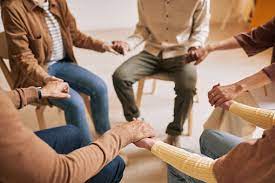Agoraphobia is a fear of being in public places or open spaces. People who suffer from agoraphobia often have a hard time leaving their homes and feel trapped in their own lives. If you are struggling with agoraphobia, don’t worry – there are treatment options available to help you overcome your fear! In this blog post, we will discuss the different types of treatments that are available for agoraphobia. We will also provide tips on how to get started on your journey to recovery.
Contents
What Is Agoraphobia?
 Agoraphobia is an anxiety disorder that can make it hard to leave your home, travel on public transportation, or be in open spaces. It can also make it difficult to go to work or school. People with agoraphobia often have a fear of having a panic attack in a place where it would be hard to escape or get help.
Agoraphobia is an anxiety disorder that can make it hard to leave your home, travel on public transportation, or be in open spaces. It can also make it difficult to go to work or school. People with agoraphobia often have a fear of having a panic attack in a place where it would be hard to escape or get help.
It is believed that agoraphobia develops from a combination of factors, including genetics, brain chemistry, and life experiences. People who have a close relative with panic disorder or agoraphobia are more likely to develop the condition.
There are also some common symptoms that are associated with agoraphobia. These can include:
- Feeling dizzy
- Sweating
- Racing heart
- Feeling short of breath
People with agoraphobia may also avoid places where they have had a panic attack or feel like they might have one. If you are living with agoraphobia, there are treatment options available that can help you manage your symptoms and live a more normal life.
What Are The Agoraphobia Treatment Options?
Sometimes the thought of leaving the safety of your home can be so overwhelming that it feels impossible. If this is how you feel, you may have agoraphobia. There are treatment options available that can help you to overcome your fear and live a normal life. Let’s discuss some common agoraphobia treatment options.
Cognitive behavioral therapy (CBT)
CBT is a type of therapy that helps you to change the way you think about your fear. You will work with a therapist to identify and challenge the negative thoughts that are causing your anxiety. You will also learn coping skills that can help you to manage your anxiety in situations where you would normally feel afraid.
For example, it could be as simple as learning how to take deep breaths or using positive affirmations. CBT usually takes place over several weeks or months and requires some effort on your part, but it can be very effective in treating agoraphobia.
Exposure therapy
 As agoraphobia is a fear of situations that might cause panic, one treatment option is exposure therapy. This type of therapy involves gradually exposing the person to the feared situation in a safe and controlled environment. The goal is to help the person learn that they can cope with the situation without having a panic attack.
As agoraphobia is a fear of situations that might cause panic, one treatment option is exposure therapy. This type of therapy involves gradually exposing the person to the feared situation in a safe and controlled environment. The goal is to help the person learn that they can cope with the situation without having a panic attack.
Exposure response prevention (ERP) is the topmost type of exposure therapy that focuses on helping the person to avoid the behaviors that they usually do in response to their fear. For example, if someone with agoraphobia is afraid of having a panic attack in a public place, they may avoid going out altogether.
With ERP, the therapist would work with the person to help them become less afraid of having a panic attack. They would do this by gradually exposing them to the feared situation while helping them to avoid their usual behaviors (such as avoiding going out).
Psychotherapy
It is common for people with agoraphobia to also have panic disorder. Because of this, many treatments for agoraphobia focus on helping people manage their anxiety and fear. Psychotherapy is one treatment option that can be very effective in managing these symptoms. It is also known as “talk therapy” and can help people learn new skills to manage their anxiety.
Psychotherapy works by helping people understand their thoughts and feelings about their anxiety. It aims to help people change the way they think and feel about their anxiety so that it is less intense. This can be done through different types of therapy, such as cognitive behavioral therapy (CBT).
Interpersonal therapy
This is a type of psychotherapy that helps people understand and work through their relationships with other people. This can be helpful for agoraphobia because it can help people learn how to cope with feeling anxious in social situations. More often, people with agoraphobia avoid social situations altogether because they are afraid of having a panic attack.
Interpersonal therapy can help people understand why they might be avoiding certain situations and how to work through those fears. It aims to help people improve their communication and problem-solving skills so that they can better manage their relationships. It can also help people learn how to cope with anxiety-provoking situations in a more constructive way.
Medications
Usually, medications are only a small part of treatment for agoraphobia. Medications can be used to treat underlying conditions such as anxiety or depression. It can also be used to help with the short-term management of agoraphobia symptoms such as panic attacks. The reason behind this is that medications only treat the symptoms and not the cause of agoraphobia.
The best way to overcome agoraphobia is through therapy and exposure to gradually increase your comfort level in feared situations. However, commonly prescribed medications include:
- Selective serotonin reuptake inhibitors (SSRIs)
- Serotonin-norepinephrine reuptake inhibitors (SNRIs)
- Benzodiazepines
- Other anti-anxiety medications
- Tricyclic antidepressants (TCAs)
- Monoamine oxidase inhibitors (MAOIs)
Support groups
 Many people with agoraphobia find support groups helpful. Being around others who understand what you’re going through can provide relief and a sense of belonging. There are often different types of support groups available, so it’s worth exploring a few to see which is the best fit for you.
Many people with agoraphobia find support groups helpful. Being around others who understand what you’re going through can provide relief and a sense of belonging. There are often different types of support groups available, so it’s worth exploring a few to see which is the best fit for you.
However, you should always keep in mind that support groups are not a replacement for professional help. If you’re finding that your agoraphobia is severely impacting your quality of life, it’s important to seek out treatment from a mental health professional.
Herbal remedies
This is one of the most popular methods used to overcome agoraphobia. People have found success using herbs such as chamomile, lemon balm, and valerian root. These can be taken in pill form or brewed into tea. It is believed that people who take herbal remedies for agoraphobia feel more relaxed and less anxious.
For instance, when someone chooses chamomile, it is thought to reduce anxiety by binding to the same receptors in the brain that are targeted by drugs like Valium.
Acupuncture
This ancient Chinese practice involves inserting thin needles into the skin at specific points. It is said to help the body release endorphins, which are natural painkillers. Acupuncture is effective in treating a number of conditions, including anxiety and depression.
A review of studies found that acupuncture can significantly reduce anxiety symptoms. If you’re interested in trying acupuncture, make sure to find a licensed practitioner who has experience treating anxiety.
Lifestyle changes
There are a few things that you must change to live without agoraphobia. Some of these common things are listed below:
- The first is your mindset. You have to think positively and be optimistic about your future. Because when you are optimistic, you will be able to see the good things that await you instead of being scared of them. You should also start preparing yourself mentally for the changes that you are about to make.
- The second thing is your environment. If possible, try to surround yourself with positive and supportive people. These people will help you feel better about yourself and will make the journey to recovery much easier. You should also avoid places that trigger your anxiety or make you feel uncomfortable.
- Last but not least, is your physical health. Make sure that you are physically healthy and fit enough to face your fears. This means eating a balanced diet, exercising regularly, and getting enough sleep. By taking care of your physical health, you will be able to better cope with the stress and anxiety of overcoming agoraphobia.
If you are willing to make these changes, then you are well on your way to living without fear. Just remember to take things one step at a time and to be patient with yourself. Recovery takes time, but it is possible. So don’t hesitate to reach out for help if you need it.
Can A Person With Agoraphobia Be Cured?
 Many people who have agoraphobia do not seek treatment because they fear their symptoms will never go away. Others may seek treatment but find that their symptoms only temporarily improve and then return. The good news is that with proper treatment, most people with agoraphobia can experience significant improvement.
Many people who have agoraphobia do not seek treatment because they fear their symptoms will never go away. Others may seek treatment but find that their symptoms only temporarily improve and then return. The good news is that with proper treatment, most people with agoraphobia can experience significant improvement.
There are two types of treatments for agoraphobia: psychological and pharmacological.
Psychological treatments involve talk therapy, which can help people with agoraphobia understand their condition and learn how to cope with their symptoms. And many types of therapy are effective for treating other anxiety disorders. On the other hand, pharmacological treatments involve medications that can help to reduce anxiety and improve mood.
So, whether you choose to see a therapist or take medication, there are many options available to help you overcome agoraphobia and live without fear.
Of course, YES, a person with agoraphobia can be cured with the right treatment!
If you or someone you know is struggling with agoraphobia, don’t hesitate to reach out for help. There are many resources available to assist you in finding the right treatment option. And with proper treatment, most people with agoraphobia can experience significant improvement. So don’t give up hope! Recovery is possible.
Conclusion
To conclude, agoraphobia treatment is possible and there are many options available to those suffering from this debilitating anxiety disorder. While it may not be difficult to “cure” agoraphobia, with proper treatment, people with agoraphobia can live relatively normal lives without fear.
In fact, many people suffer from agoraphobia and have never even been diagnosed. This is because they have found ways to cope with their anxiety and live relatively normal lives. Therefore, if you are suffering from agoraphobia, know that you are not alone and there is hope for a better future.
For more tips and guidance, you can reach out to Therapy Mantra. The team of professional counselors is more than happy to help you in your journey to recovery. Contact us today to learn more about our services. You can also book an online therapy session or download our free Android or iOS app.


